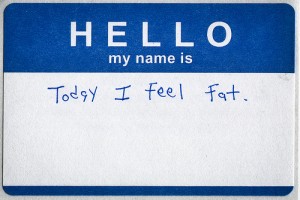 This morning, I came across an absolutely fascinating study by researchers from the Norwegian University of Science and Technology. According to the study, normal weight teenagers who perceive themselves as fat are more likely to become overweight adults.
This morning, I came across an absolutely fascinating study by researchers from the Norwegian University of Science and Technology. According to the study, normal weight teenagers who perceive themselves as fat are more likely to become overweight adults.
Back in the mid 1990s, researchers surveyed nearly 1200 teenage boys and girls with normal bodyweights. Roughly ten years later, the researchers followed up with the now-adult participants. While half of the participants still had normal bodyweights, the researchers found some interesting insights about the now-overweight individuals:
- 59% of the girls and 65% of the boys who perceived themselves to be fat as teenagers grew up to be overweight according to their body mass index (BMI).
- 78% of the girls and 55% of the boys who perceived themselves to be fat as teenagers grew up to be overweight according to the circumference of their waist.
In contrast:
- 31% of the girls and 29% of the boys who perceived themselves to be fat as teenagers grew up to be overweight according to their body mass index (BMI).
- 55% of the girls and 48% of the boys who perceived themselves to be fat as teenagers grew up to be overweight according to the circumference of their waist.
In other words, far more of the normal weight teens who felt fat (even though they weren’t) actually became overweight as adults. In fact, their BMI averaged .88 higher and their waistlines were 3.46 cm larger. But why?
Researchers speculate that teens who felt fat were more stressed than their counterparts. Since stress is associated with weight gain, this could offer one an explanation. Moreover, these teens may have tried to lose their perceived fat by skipping meals and starvation - a strategy that ultimately results in weight gain.
Personally, I think the answer could be a bit deeper. If we have a good, healthy relationship with our body, then we’re more likely to do things that honor it - like eat a healthy diet and engage in exercise. If, on the other hand, you don’t like your body and use negative words against it - like calling it fat - then that relationship can deteriorate and lead to unhealthy habits.
And let’s not forget the power of visualization. By visualizing something, you can help bring it into reality. If you see yourself winning the gold medal or lifting a certain amount of weight or just eating your vegetables, you can breath life into your thoughts. Perhaps, by seeing themselves as fat, these individuals subconsciously cultivated habits that made their belief an reality.
Obviously, it will take subsequent research and data to draw stronger conclusions - but, in the meantime, this study is great food for thought.
What do you think? Are you surprised by the results of this study?









